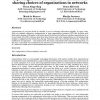Free Online Productivity Tools
i2Speak
i2Symbol
i2OCR
iTex2Img
iWeb2Print
iWeb2Shot
i2Type
iPdf2Split
iPdf2Merge
i2Bopomofo
i2Arabic
i2Style
i2Image
i2PDF
iLatex2Rtf
Sci2ools
AMCIS
2015
Springer
2015
Springer
Exploring factors that influence information sharing choices of organizations in networks
Organizations do not just decide on whether or not to exchange information digitally. In many cases, there are multiple alternative configurations of inter-organizational systems (IOS) that facilitate such information sharing. Although a lot is known about the factors that influence whether organizations do or do not adopt IOS, little is known about how these factors work when organizations are choosing among multiple configurations for information sharing. This paper takes two archetypical IOS forms - dyadic and multilateral arrangements – and explores how the known antecedents affect choosing among them. To this end, a case study was conducted on the selection and development of an IOS for information sharing in a network of utility service and infrastructure providers. Keywords IOS, configuration, choices, adoption, networks
AMCIS 2015 | Business |
| Added | 15 Apr 2016 |
| Updated | 15 Apr 2016 |
| Type | Journal |
| Year | 2015 |
| Where | AMCIS |
| Authors | Marijn Janssen, Bram Klievink, Thom Singerling, Mark de Reuver |
Comments (0)

